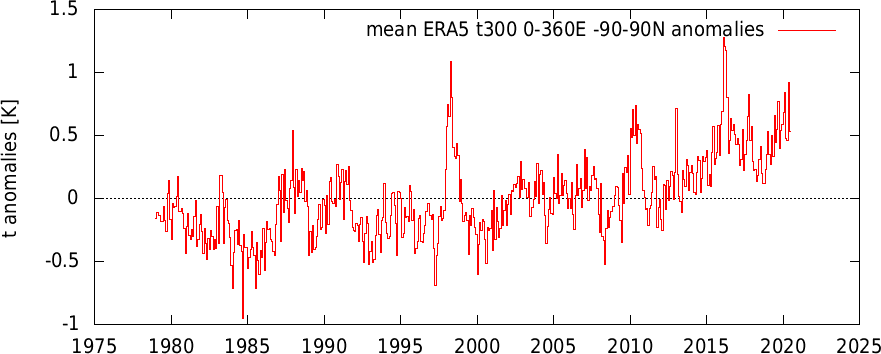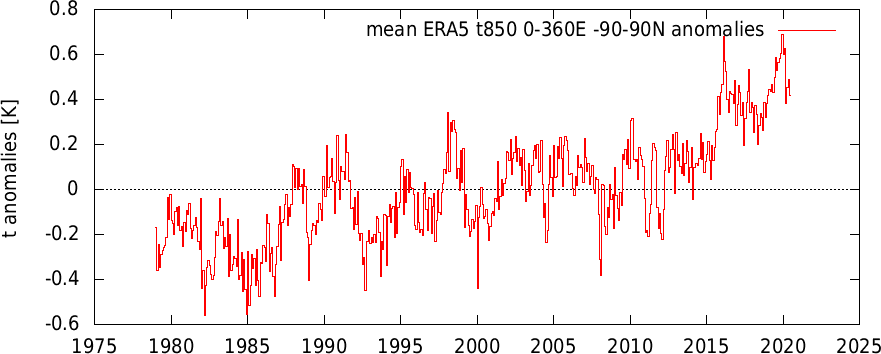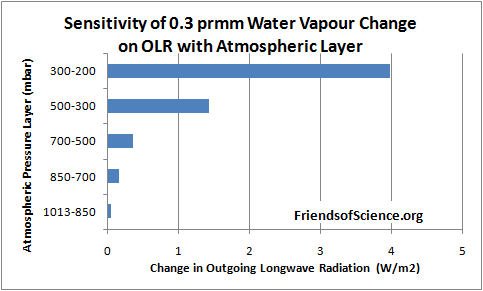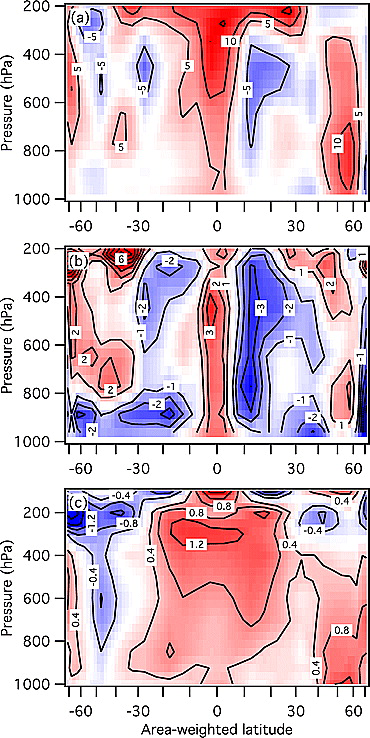
blizzard1024
Meteorologist-
Posts
1,078 -
Joined
Content Type
Profiles
Blogs
Forums
American Weather
Media Demo
Store
Gallery
Everything posted by blizzard1024
-
Global Warming Makes Weather In Boreal Summer More Persistent
blizzard1024 replied to bluewave's topic in Climate Change
What about ocean currents? What about global cloud cover? What about global convection? You left off a bunch of stuff. That is why they invoke the use of climate models. But these models don't handle said clouds or convection explicitly. So it is a leap of faith to believe them.... -
Global Warming Makes Weather In Boreal Summer More Persistent
blizzard1024 replied to bluewave's topic in Climate Change
Really, try 4 times the state of SC for solar farms and wind energy. Green energy companies downplay bird deaths to make a money. They are just like any other big corporations. Solar farms same thing. Why not have panels on people's homes and buildings? Because there would be no grid to sell you power. The "green" corporate folks are looking to cash in on this exaggerated climate change predictions. You think they really care about the environment? Naive. Any who the heck do you think you are? I have explained to you dozens of times that CO2 does not drive climate and you don't listen. You say I am propagating lies? I could say the same thing about you. But I am not stooping to your level. This is unfair and malicious of you. I continue to try to get you removed from this forum. This forum has no place for climate activists that are abusive and offensive to others. People like you are shutting down science. I hope I am successful in getting you removed. Maybe you can start you own forum and I won't be on it. -
Global Warming Makes Weather In Boreal Summer More Persistent
blizzard1024 replied to bluewave's topic in Climate Change
Yep. I actually agree 100%. can you believe that? -
Global Warming Makes Weather In Boreal Summer More Persistent
blizzard1024 replied to bluewave's topic in Climate Change
I respectfully disagree here. How do they know? Climate models do not have this level of precision to make such claims. If you believe the models yes, you are correct. I am skeptical of atmospheric models especially ones that don't forecast convection or clouds explicitly. -
Global Warming Makes Weather In Boreal Summer More Persistent
blizzard1024 replied to bluewave's topic in Climate Change
Yes I agree that a doubling of CO2 would bring around 1.2C or so of warming. Modest warming, not a crisis. -
Global Warming Makes Weather In Boreal Summer More Persistent
blizzard1024 replied to bluewave's topic in Climate Change
How? How do you know that? Let me guess...climate models. yeah right! Climate models are insufficient like weather forecast models. They have some usefulness but not this kind of precision. So this is all based on climate models. I know this. That is where I have to disagree. I want to see data, that proves a water vapor feedback first and foremost. So far, I haven't seen anything convincing. ERA5 was very interesting to look at but a 1:1 relationship of high level T and specific humidity? What is the mechanism? The only I can think of is tropical convection. That is NOT a positive feedback. It is the prevalence of El Ninos over La Ninas since 1977 the great climate shift. -
Global Warming Makes Weather In Boreal Summer More Persistent
blizzard1024 replied to bluewave's topic in Climate Change
How do you know the modest warming isn't natural? The Earth likely has been in an energy imbalance since the 1800s, the end of the Little Ice Age. That's all. -
Global Warming Makes Weather In Boreal Summer More Persistent
blizzard1024 replied to bluewave's topic in Climate Change
ANYTHING that doesn't go along with the "CO2 is the thermostat of the planet narrative" is dismissed. UAH for instance doesn't include the spurious warmth of NOAA14. BUT the other satellite datasets keep it. So they must be right /sarc. The surface record is rife with changes in instrumentation, land use and even location changes over 100s of sites across the planet. Plus the way SSTs were measured has changed so much in 150 years. BUT it shows a lot of warming especially after "homogenization"....i.e adjusting upward in the present and cooling the past. So this dataset is better than UAH? Of course it is /sarc because we already know that CO2 is our global thermostat. Cloud datasets show that cloud fraction seems to correlate well with global average temperature. Whoops, wait a minute.... NO it can't be correct /sarc. We know what Arctic sea ice was like in the 1930s without satellite data. It had to much higher than today, of course is was /sarc. Now NCEP reanalysis data which matches up with NASA NVAP specific humidities at high levels is wrong because it shows a negative feedback. But ERA5 is correct because it shows a linear almost 1:1 relationship with temperatures in the upper troposphere. It doesn't matter that the low levels don't make sense at all. Just sweep that under the rug. What is the mechanism besides convection for the upper tropospheric T and q 1:1 correlation? What is the mechanism? Just because temperatures warm doesn't mean the air moistens. So basically the entire "science" is dedicated to prove CO2 is the global thermostat. The tail is wagging the dog. -
Global Warming Makes Weather In Boreal Summer More Persistent
blizzard1024 replied to bluewave's topic in Climate Change
Nevertheless the data shows an inverse relationship between temperature and cloud fraction. But they ignore this because it explains the recent temperature trends quite nicely. More lunacy. -
Global Warming Makes Weather In Boreal Summer More Persistent
blizzard1024 replied to bluewave's topic in Climate Change
Wind is terrible for the environment. It destroys natural habitats, fragments forests, and yes it does kill birds, especially raptors which include eagles. The eagles finally make a comeback due to the environmental movements of the 1970s. Now ironically it is the same groups that will cause their demise. Solar farms take up so much land that destroys habitats. So we wreck the planet to save the planet? This is lunacy. -
Global Warming Makes Weather In Boreal Summer More Persistent
blizzard1024 replied to bluewave's topic in Climate Change
Plus this ERA5 dataset doesn't even make sense showing drying at 850 mb when the Earth was warming from the late 1970s to 2000? This dataset is obviously flawed. Plus the correlation with temperature and specific humidity at 500 and 300 mb is striking. Something isn't correct with this dataset. BUT it fits the narrative of the climate crisis so IMO climate scientists are being disingenuous. They overlook such things because they are inconvenient. If a dataset goes against their preconceived notions, of course it HAS to be wrong. NASA's cloud fraction from 1983-2009 is a great example. This dataset shows an inverse relationship to global average temperature and global cloud fraction. Hmmm. So of course this can't be accurate too. It goes on and on. NCEP water vapor shows moistening down low where there is convective mixing and slight drying above suggesting precipitation processes are leading to a negative water vapor feedback. Nope. Can't be. You see where I am going? There is no objectivity anymore. I want to see data and I thank you for sharing this KNMI explorer site. And no I don't trust the peer review process it is very flawed. -
Global Warming Makes Weather In Boreal Summer More Persistent
blizzard1024 replied to bluewave's topic in Climate Change
Seriously? You have got to be kidding me. You have a highly non-linear dynamical climate system with clouds, and convection and a one to one relationship between temperature and specific humidity at high levels in the troposphere and you compare this to something simple like gravity? Shows a deep lack of understanding of atmospheric science.... -
Global Warming Makes Weather In Boreal Summer More Persistent
blizzard1024 replied to bluewave's topic in Climate Change
ERA5 reanalysis data specific humidities, q, at 500, and 300 mb show almost a 1:1 correlation with temperature. 200 mb q looks like 500 and 300 mb but the temperature trends are contaminated by the fact that 200 mb is in the stratosphere farther north and south on the globe and especially in the winter months (both hemispheres). So the cooling of the lower stratosphere offsets some of the warming in the upper troposphere and there is no temperature trend at all. But 500 and 300 mb are pretty much wholy in the troposphere. 500 mb looks similar. Look at 850 mb... But for some strange reason, the 850 mb temperature and specific humidities decline from the late 1970s to around 2000 and then increase. If anywhere in the atmosphere there should be a nearly 1:1 correlation it IS at 850 mb because warmer(colder) temperatures leads to more(less) evaporation off the oceans and land since 850 mb is well within the diurnal convective mixed layer. Once you get above 700 mb, you are well above the mixed layer for most of the planet. So at 500, and 300 mb a 1:1 correlation looks fishy. There is no mechanism that would describe this very short term strong correlation that I could think of except global convection. If the temperature increases at 300 mb for instance, yes it CAN support more water vapor but some mechanism has to get the water vapor up there. Conversely at 850 mb, there IS a mechanism that explains why more warmth = more water vapor, it is insolation and convective mixing. So this ERA5 data is either suspect IMO in the lower troposphere and is more likely is showing increased global convection causing more water vapor at high levels. This would not be proof that there is a long term positive feedback as has been described by many authors. In many respects NCEPs reanalysis data does show increasing water vapor at the lower levels up to 600 mb and then decreasing water vapor above. This actually makes more sense in the low-levels because of the warming planet and more evaporation. Precipitation processes and enhanced convection would eventually lead to drying in the upper troposphere and a negative feedback. Radiosondes also show this too of which I believe NCEP uses in their reanalysis data. The fact that the NASA NVAP satellite retrieval data showed drying upper troposphere too until 2001 (data never released to 2009) which agreed with the radiosondes also suggests NCEPs data could be more accurate. In any event, I wish I could see the AIRs datasets which supposedly support the positive feedback but I wonder if they would show the same thing as ERA5. A while back, I read from Spencer and Christy a criticism of AIRS (I can't find it yet, I believe it was a blog post) that there is a lot of difficulty in retrievals of water vapor due to clouds and even radiances from temperatures at high levels. I wonder if that also is why this ERA5 data looks suspect. In any event, it is far from certain that there is a significantly positive water vapor feedback. That is a reasonable statement IMO based on the data so far. -
Global Warming Makes Weather In Boreal Summer More Persistent
blizzard1024 replied to bluewave's topic in Climate Change
Ok. I will look again. -
Global Warming Makes Weather In Boreal Summer More Persistent
blizzard1024 replied to bluewave's topic in Climate Change
I totally agree that nuclear energy would be the way to go assuming it is safe and there is where the fear is. But yes ultimately it's too bad there was Three Mile island, Chernobyl and Fukushima. These accidents/disasters I think really hurt nuclear energy proliferation. -
Global Warming Makes Weather In Boreal Summer More Persistent
blizzard1024 replied to bluewave's topic in Climate Change
Don't they have specific humidity? Plus this is a reanalysis dataset. It is nice to see another dataset and I thank you but where did you get this from? I would like to explore it. Thanks -
Global Warming Makes Weather In Boreal Summer More Persistent
blizzard1024 replied to bluewave's topic in Climate Change
The paper on increasing stratospheric water vapor is relevant to enhancing the Greenhouse effect. But what is odd, is that the stratosphere has been cooling mainly due to ozone loss and lack of volcanic eruptions,and CO2 increases as well. This increase in water vapor has to be from another mechanism and not a positive water vapor feedback. It is likely related to more tropical convection from increased El Ninos since 1977 from overshooting tops into the stratosphere. It also (I believe) is related to increased air travel through the decades. This increase in water vapor does enhance the Greenhouse effect but it likely is not related to CO2 increases directly. That is your opinion which you are entitled too. Here are two other peer review papers. https://www.researchgate.net/publication/226349531_Trends_in_middle-_and_upper-level_tropospheric_humidity_from_NCEP_reanalysis_data Paltridge et al. (2009) and https://judithcurry.com/2015/01/08/miskolczi-discussion-thread/ Miskolczi's paper What is your opinion of these papers? They are peer reviewed too. Also spencer and christy have published a lot too. Judith Curry as well. But if these don't conform they are dismissed and indeed I agree that especially Miskolczi may have some problems. Paltridge et al. (2009) is important in that it shows how much uncertainty there is in upper level tropospheric water vapor. You may not agree with NCEP reanalysis and NASA NVAP satellite data which show a drying upper troposphere and that is fine. I happen to think there is validity since they are independent datasets, but that is my opinion. My main question is where can we find a time series of upper tropospheric AIRs data? That showed a positive feedback trend with higher temperatures from Dessler's research a while ago. I want to see if it is ENSO related or not. It is difficult to find such a time series anywhere. Global cloud fraction is very important too. Both of these are critical to assessing the Greenhouse effect and feedbacks in real-time and it is shame that they aren't available. I want to see this data. If this data indeed shows an enhancement to the Greenhouse effect that is when a skeptic like myself will start agreeing more with you folks. Thank you. -
Global Warming Makes Weather In Boreal Summer More Persistent
blizzard1024 replied to bluewave's topic in Climate Change
People assume more water vapor through the atmospheric column leads to enhanced greenhouse effect. That is not true. The paper should have looked at upper tropospheric water vapor where it counts. I don't know why this is a very relevant paper. Warmer Earth, more evaporation off oceans = higher PWV. Not much new here. And please don't put me in the "denier" crowd. I don't deny that CO2 causes some warming. I just am skeptical of the extreme viewpoint called the climate "crisis". Thank you skier. -
Global Warming Makes Weather In Boreal Summer More Persistent
blizzard1024 replied to bluewave's topic in Climate Change
Now 400 mb would have more of an effect as shown here. BUT you can easily see the ENSO signature which suggests the moistening is more from El Ninos and less from overall warming. You can't separate out the two. El Ninos lead to more tropical convection which moistens and heats the upper troposphere. 400 mb is not quite upper troposphere but it would easily be heated and moistened by said convection. This is basic radiative transfer. -
Global Warming Makes Weather In Boreal Summer More Persistent
blizzard1024 replied to bluewave's topic in Climate Change
Please explain. It is well known that it is upper tropospheric water vapor that is the most important when it comes to the Greenhouse effect. Why do you think they criticize NCEPs specific humidity? It does show rises in the lower troposphere but declines in the very dry upper troposphere. There was a peer reviewed paper that looked at this very effect and found a constant greenhouse effect based on NCEPs dataset of water vapor showing declines in the upper troposphere. This paper has been ignored because scientists don't believe NCEPs dataset showing declining upper tropospheric water vapor. I know I am correct on this, it is the upper troposphere that counts for the greenhouse effect. CO2 does nothing in the lower and even mid-troposphere, it is the high levels where it counts. This is fundamental. -
Global Warming Makes Weather In Boreal Summer More Persistent
blizzard1024 replied to bluewave's topic in Climate Change
Thank you for this paper. Here is the fundamental problem with their results. They are using global precipitable water vapor(PWV). Since water vapor rapidly decreases with height, this metric of water vapor is mostly what is happening in the lower troposphere. Since the oceans have been warming GPW has increased in all datasets (even NCEP). It is the upper troposphere that matters when it comes to the greenhouse effect. More greenhouse gases in the lower troposphere actually cool the layers above them. Similar to how the stratosphere cools above the troposphere with enhanced GHGs (assuming ozone is constant which it is not). So the upper troposphere is where it counts for both CO2 and H2O. These researchers do not seem to understand this. Here is a quote from the paper... "The increased greenhouse gases reduce the outgoing longwave radiation and contribute to the global warming phenomenon. Studies have shown that the global mean surface temperature has increased by 0.7–0.8°C since the beginning of the twentieth century [Hansen et al., 2001; Smith and Reynolds, 2005; Parker et al., 2007]. Atmospheric water vapor provides the single largest positive feedback on global warming [Dai, 2006; Mieruch et al., 2008; Zhang et al., 2013]. Both climate models and observations suggest that an upward trend in water vapor is expected to appear as a response to the surface temperature increase [Held and Soden, 2006; Santer et al., 2006; Zhang et al., 2013]. Monitoring the variation of atmospheric water vapor is thus significant not only for the detection of climate change but also for a better understanding of water vapor feedback on global warming." So they understand the role of water vapor as a feedback but use the wrong measurement. They use the whole troposphere. It needs to be upper troposphere. That is why you have to be careful about peer reviewed papers. These authors probably don't understand radiative transfer that well and the reviewers also. -
Global Warming Makes Weather In Boreal Summer More Persistent
blizzard1024 replied to bluewave's topic in Climate Change
Here are two papers related to AIRs moisture retrievals and ENSO that concerns me. https://agupubs.onlinelibrary.wiley.com/doi/full/10.1029/2008GL035333 So the premise is Dessler looked at global temperature and water vapor datasets from a warmer period DJF 2006-2007 El Nino and then subtracted a colder DJF 2007-2008 from a La Nina. The figure below does show warmer temperatures coincide with higher values of upper level water vapor, q. But mainly over the equatorial regions. There is drying north and south of the tropics is related to subsidence from enhanced tropical convection. Tropical convection does indeed increase during El Ninos vs La Ninas... see https://agupubs.onlinelibrary.wiley.com/doi/abs/10.1029/2019JD031026#:~:text=Convective organization has a large,scale circulations in the tropics.&text=The occurrence of organized deep,twofold outside of these regions. So with more tropical convection, it is the heat AND moisture fluxes associated with said enhanced tropical convection leading to this apparent positive feedback. You can't separate out the ENSO signal. To me, this clearly does not prove a long term positive feedback from warming. It is just tropical convection and heat/moisture fluxes upward. -
Global Warming Makes Weather In Boreal Summer More Persistent
blizzard1024 replied to bluewave's topic in Climate Change
I saw this. I am not saying that the Earth is not warming, it clearly is. So in a warming world, we would see extremes like this. The central question to me is how much is related to the enhanced greenhouse effect specifically from CO2 BUT also increases in upper level water vapor. I really would like to see real-time upper tropospheric water vapor data monthly like what you can get on the NCEP reanalysis. If you look at this monthly data, the greenhouse effect pretty much is stable since CO2 increases are offset by drying in the upper troposphere. This would suggest the warming is natural. HOWEVER, other datasets show upper tropospheric moistening and a positive feedback. Many don't agree with NCEPs data. That is fine. I would like to see the other dataset. In this way, we can monitor the greenhouse effect monthly. But this data is very hard to come by. I just can't find it. I also would like to see total cloud fraction of the Earth. NASA did this from 1983-2009. These two datasets on a monthly basis would be awesome to monitor the effect of clouds and the water vapor feedback. Until I can see this data, I am stuck with NASAs cloud data which showed an inverse relationship w/ global temperatures 1983-2009. And NASA NVAP water vapor data at high levels which was consistent with NCEP reanalysis data up until 2001. NASA never released this data to 2009 which is frustrating. AIRs satellite data apparently shows a positive feedback. Where is the upper level water vapor dataset in a time series. You can then tease out the ENSO signal to make sure it is not driven by ENSO. Soden's study in the 1990s showed a positive feedback after Pinatubo cooling. But when I examined the data in detail, his data started during an El Nino and ended in a La Nina which would affect the level of moisture in the upper troposphere. So it is hard IMO to separate the two out factors out. So if anyone can find a time series of AIRS data and also cloud fraction to recent years please share. Thank you. -
Phoenix Records its Hottest Summer on Record
blizzard1024 replied to donsutherland1's topic in Climate Change
I have read the abstracts and conclusions so far. I knew about the Norway papers from Oslo and of course I read the Lewis and Curry paper a while ago. These papers both are around 1.64 to 1.8K ECS. So most of these papers seem to converge on roughly 1.5 to 2.0K, again I read the Oslo one and Curry's before. And you state there are many more. OK, that is fine. But these folks don't get the splashy news headlines and hype. It is the researchers who promote their work to the media hype machine that get all the attention. These papers (except for the second and last one) don't really suggest much reason for alarm. Curry has been banished which is a big loss, the Oslo folks I saw years ago get crushed. I am not familiar with the other papers. I do thank you for your patience and providing these. The first paper uses the highly uncertain OHC and surface record back to preindustrial times which also is very uncertain as a metric. The second paper uses data from HadCRU, GISS and MSU TMT and this is probably why there is such a big range. GISS is an outlier in having too much warming. This paper doesn't really add much to the oft quoted 1.5 to 4.5K ECS for doubled CO2. It is just a little lower. Lewis and Curry talk about base periods in the 1800s, I can't remember what they used for temperature record since I don't have access right now to the full paper. But it has to be the very unreliable earlier datasets. The 4th paper uses HadCrut4 which again has a lot of uncertainties in the early predindustrial era. The last one constraints the ECS to above 1.5K but lowers the top more to 3.4K. They use CMIP models since 1975 a known global cool period. Natural processes were a part of the 1960s and 70s cool period and to assume all the warming since 1975 is from CO2 is erroneous. They also mention the uncertainties with aerosol forcing which I agree. There is a lot of uncertainties there. The biggest issues I see with all of this is 1) we really don't know what the global average temperature was in the late 1800s. 2) None of these papers account for natural processes that would affect the climate that are not understood, i.e clouds, convective overturning etc and 3) feedbacks and forcings can get messy in untangling see spencer and christy's work on this. The problem is extremely complex and to make policy decisions based on higher sensitivity or even 1.5K (the so-called danger mark) is nuts IMO. Plus we have warmed about .6C to .7C from both surface data and UAH since just before the El Chichon eruption in 1982. (RSS has too much warming compared to these datasets having .8 to .9C) Again the 1970s was globally a cool period so much of this warming could be related to interdecadal variability. To blame fires, heat waves, intensifying hurricanes, winter storms, arctic outbreaks, floods and individual weather events on climate change or a "climate crisis" right now on a small amount of warming is absurd and basically part of the ever worsening media-hype campaign. This hype is because the competition for news is extreme now with all the different sources. Climate change has become part of this hype and even weather forecasting too. The NHC is naming everything now and continues to overdo wind estimates of storms/hurricanes before landfall. I have seen this first hand. They want to get people to take action so they overdo the intensity of the storm as it approaches land to make sure people take the storm seriously and don't let their guard down. I have seen this on several occasions, but not all. So even weather forecasting has become part of this media-hype machine. This plays back into a university researcher trying to make a name for themselves or their institutions with research especially climate research. There is bias. I question everything that is my nature. If that offends people on this forum I apologize. But I do agree with all of you that we should stop polluting the atmosphere and environment (this includes pesticides herbicides too), help 3rd world countries have a decent quality of life and respect everyone no matter what your race, color, or creed is. If we can do this, it would solve many environmental problems and help calm down the insanity the world is going through right now. The media needs to STOP hyping everything and politicians need to start representing US. This utopian view unfortunately probably will never happen.... Thank you skier for a nice discord. Stay safe. -
Phoenix Records its Hottest Summer on Record
blizzard1024 replied to donsutherland1's topic in Climate Change
Please list them. I would like to read them.



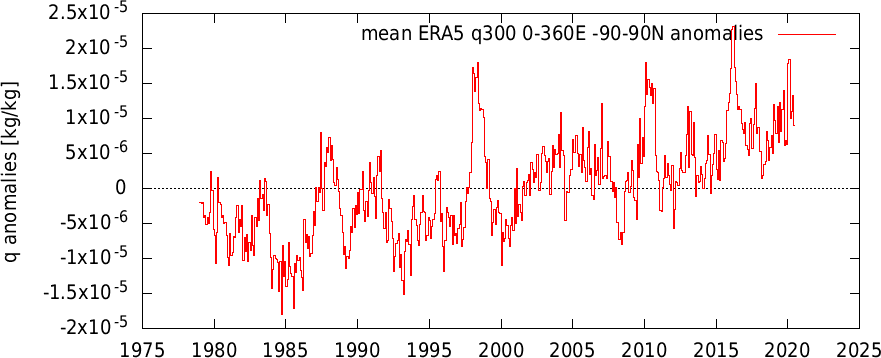
.png.ca94ebd007725cdbf7dac62ba6c6568b.png)
